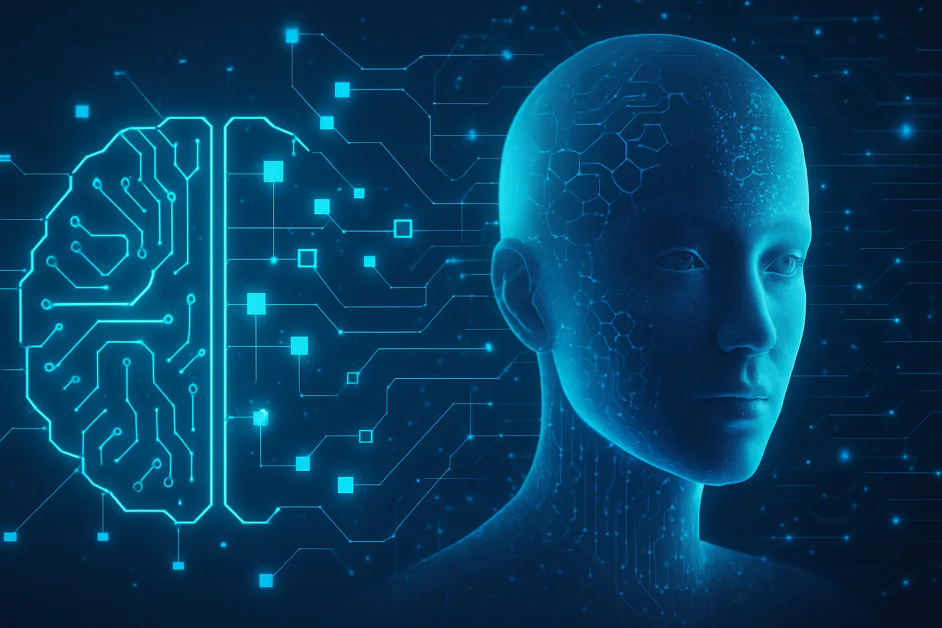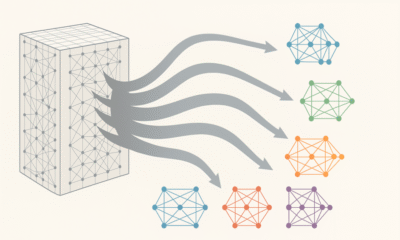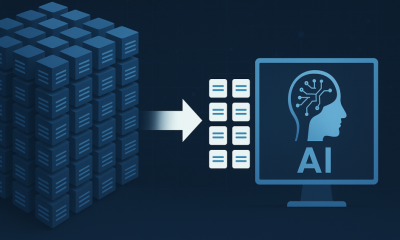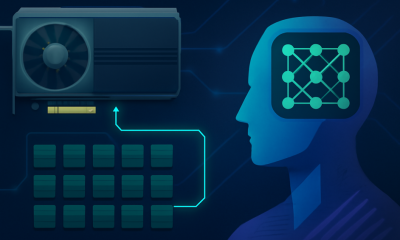Artificial Intelligence
Lightchain AI’s Mainnet Launch: Pioneering AI-Driven Blockchain with Proof-of-Intelligence

Imagine a doctor in a remote location securely running a machine learning model to diagnose a rare disease. This process needs high privacy and reliable computations. Lightchain AI enables this possibility by combining Artificial Intelligence (AI) with blockchain technology. This project launched its mainnet in July 2025. This is a significant step in merging AI tasks with decentralized networks.
Lightchain AI introduces a new consensus model called Proof-of-Intelligence (PoI). Unlike traditional mining, which often wastes energy, PoI rewards nodes that perform useful AI computations. These can include model training, inference, or problem-solving tasks. The platform also runs AI models directly on-chain through its Artificial Intelligence Virtual Machine (AIVM). The AIVM supports popular AI frameworks, making decentralized AI practical.
The Blockchain AI Market
The blockchain AI market is experiencing rapid growth. Its value has already reached hundreds of millions of dollars, with strong projections for further expansion in the coming years. This growth is primarily driven by the increasing demand for secure and transparent platforms that enable AI models to operate without compromising data privacy.
Traditional AI systems mainly rely on centralized cloud infrastructure. While these systems are effective, they come with challenges. High operational costs, the risk of data breaches, and a lack of transparency in how AI decisions are made are significant concerns. Blockchain technology offers a promising alternative. It provides a decentralized ledger that records every AI operation in a transparent and tamper-proof way.
At the same time, many startups and enterprises in the Web3 space are looking for privacy-preserving AI frameworks. They need solutions that allow them to apply AI in fields such as healthcare, finance, and Decentralized Finance (DeFi), where sensitive data is involved. These users want to ensure data confidentiality while still gaining insights from machine learning.
To meet these needs, technologies such as federated learning and zero-knowledge proofs are becoming increasingly important. These methods allow AI to be trained and run on private data without exposing it. They help ensure both privacy and accuracy, making them suitable for decentralized environments.
Recent industry research highlights this ongoing change. Blockchain is becoming more important in running real-time AI analytics and in supporting decentralized applications. New efforts, such as Lightchain AI, are part of this movement. They focus on AI systems that are both scalable and privacy-aware. These solutions align with the current market needs and facilitate the broader adoption of secure, decentralized AI technologies.
What Is Lightchain AI?
Lightchain AI is a specialized Layer-1 blockchain built to support advanced AI use in a decentralized setting. It offers a trusted space where users can run AI tasks securely, even in sensitive environments such as healthcare or finance.
A key part of this platform is its AIVM, which enables AI models to be processed across the network. Unlike other blockchains that rely solely on transactions, this system is specifically designed for running machine learning workloads. It works with commonly used tools like PyTorch, ONNX, and TensorFlow, helping developers use familiar methods while benefiting from added privacy and control.
The project was launched by a team with substantial experience in AI and blockchain systems. They began working on Lightchain AI in 2023 to address common issues, including limited trust, high energy consumption, and centralization, in traditional platforms. In its early phase, the project raised over $21 million in presale funding, showing early support from the community and investors.
One of the platform’s primary strengths is its emphasis on maintaining data security. It employs privacy-enhancing techniques, including federated learning and zero-knowledge proofs. These allow models to learn from local sources without exposing private data. The platform’s open design also encourages developers to build applications that are fair, efficient, and aligned with the principles of decentralization.
Lightchain AI for Efficient and Privacy-Focused Intelligence
Lightchain AI enables decentralized execution of machine learning tasks while maintaining strong privacy and high performance. It removes the need for centralized infrastructure by allowing AI models to run directly on a blockchain-based network.
Its execution environment, called AIVM, supports widely used frameworks such as TensorFlow, PyTorch, and ONNX. This compatibility enables developers to utilize their existing models without requiring significant modifications. As a result, teams can deploy applications more easily and reduce development overhead.
The system is designed to protect data. It integrates privacy-preserving technologies, including zero-knowledge machine learning, federated learning, and homomorphic encryption. These methods enable sensitive computations, such as patient record analysis or financial model evaluation, to be performed without exposing the original data to any external system.
Lightchain AI uses a novel consensus mechanism called Proof-of-Intelligence (POI). Instead of performing wasteful computations, network nodes contribute to functional AI tasks, such as training or inference. The outputs are verified using cryptographic techniques. Only verified results receive rewards. This approach reduces energy consumption and enables participation even for institutions with limited computing resources.
The platform supports parallel execution and dynamic scaling. These features ensure low latency and consistent throughput under high demand. Performance tests showed response times under 300 milliseconds, which is suitable for real-time use cases such as fraud detection or adaptive content delivery.
To help developers get started, Lightchain AI provides open-source SDKs, well-documented APIs, and community support. It also runs technical programs, gives grants, and encourages contributions through regular outreach activities. Governance is handled by token holders, who can review proposals, suggest updates, and vote on key decisions. System reliability is further strengthened through independent security audits and active bug bounty efforts.
Lightchain AI combines usable AI computing, secure data handling, and decentralized trust to support applications where speed, transparency, and privacy are essential.
Real-World Applications
The potential applications of Lightchain AI span several domains that require secure, privacy-aware, and decentralized AI execution. Its architecture is designed to support sensitive tasks without relying on centralized infrastructure.
In healthcare, the platform could be used to process diagnostic and laboratory data using AI models. Since Lightchain AI includes privacy features such as encrypted computation and zero-knowledge proofs, it is suitable for handling patient information without exposing raw data. Hospitals or research institutions may consider this approach to enhance trust and transparency in diagnostics while complying with data protection regulations.
In finance, the system may support the deployment of fraud detection models or real-time risk assessments directly on-chain. This could reduce reliance on third-party infrastructure, ensure tamper-evident audit logs, and enhance the speed and consistency of financial decisions in areas such as high-frequency trading or anti-fraud workflows.
Supply chain and logistics operations might also benefit from decentralized AI. Lightchain AI’s infrastructure is well-suited for tasks such as demand forecasting, route optimization, and inventory planning. By running models in a distributed setup, stakeholders can maintain data integrity and traceability without compromising sensitive business information.
For infrastructure- and compute-intensive industries, the platform presents a viable alternative to centralized cloud services. Organizations may reduce costs and latency by handling model execution locally, while keeping all relevant records verifiable on-chain.
Future possibilities include integration with DeFi, cross-chain AI task execution, and tools for launching AI-powered community tokens. These features are designed to promote broader adoption and enable developers to create more flexible and user-centric decentralized AI applications.
Taken together, these potential use cases show that Lightchain AI is suited for technically demanding environments where privacy, transparency, and trust are essential.
The Bottom Line
The future of AI may rely on systems that are efficient, transparent, and decentralized. Lightchain AI brings one such possibility. Instead of using energy on unnecessary tasks, its model encourages AI computations that have real-world value. This makes it suitable for sensitive fields such as healthcare, finance, and logistics, where data privacy and trust are essential.
Lightchain AI runs AI tasks in a decentralized setup with privacy protection and verifiable results. This helps reduce the need for central servers. Future updates may enhance its features and enable it to work with additional platforms. Its strength lies in its simple and functional design. It focuses on solving real problems instead of chasing trends. While more work and testing are still needed, it shows a clear and practical path forward to AI that is secure, efficient, and useful for real-world needs.












